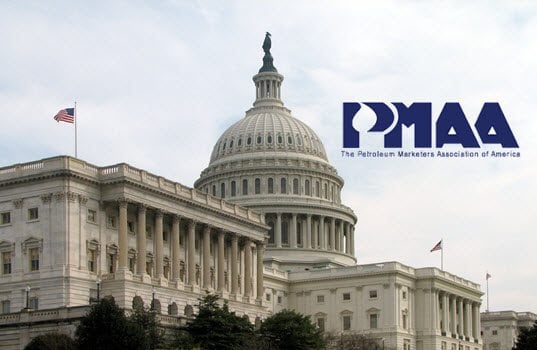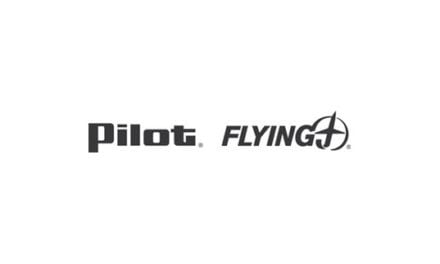By Keith Reid

Rob Underwood
We operate in a highly regulated industry that must adapt to a new slate of challenges, often major in scope, each year. However, there is a new administration in Washington, D.C., and 2017 certainly promises to be an “interesting” year. In February, Fuel Marketer News (FMN) interviewed PMAA President Rob Underwood for a look at the anticipated regulatory and legislative activities for the coming year. The Petroleum Marketers Association of America is a federation of 46 state and regional trade associations representing approximately 8,000 independent petroleum marketers nationwide.
FMN: What are some of the legislative issues PMAA is poised to take on as we start 2017?
Underwood: There are several that PMAA can get involved in from the start; for example, the Renewable Fuel Standard (RFS). Our top priority is lowering the corn-based ethanol mandate. The Environmental Protection Agency (EPA) increased it to 15 billion gallons during the last few months of the Obama administration. We’ve always said that the ethanol mandate needs to be capped at 9.7% of [gasoline] supply, or even lower. That, of course, will help to avoid any underground storage tank (UST) compatibility issues and all the potential market chaos that comes along with the higher ethanol mandate.
FMN: That will impact renewable identification numbers (RINs) as well.
Underwood: Yes, lowering the corn ethanol mandate will reduce the RIN value. The majority of jobbers—both branded and unbranded—are unable to blend at the rack in today’s environment, and could now be at a competitive disadvantage to major chains, who are able to buy above the rack and do their own blending to take advantage of the lucrative RIN value. Reducing the ethanol mandate will lower the RIN value, which will level the playing field in the retail motor fuels marketplace.
FMN: Speaking of RINs, is there a PMAA position on the obligated party issue? Currently that is the producer, who is typically a refiner or importer, but there is a push by the refining sector to move that down to the rack.
Underwood: PMAA has historically been opposed to moving the obligated party down to the rack, but the market dynamics have changed. We’re trying to get some new information from marketers across the country to see how things will play out with such a move. That’s where things stand today.
FMN: The Trump administration is a considerable departure from the previous administration regarding its position on environmental and regulatory issues of interest to the industry. What do you expect from this change in focus?
Underwood: President Trump issued an executive order that basically says, for every new regulation submitted, two existing regulations need to be eliminated. Trump’s move essentially prevents any new onerous regulations from being issued during his time in office. For regulations finalized in the last 60 days of the Obama administration, President Trump and Congress can overturn them rather quickly.
However, it’ll be a long and arduous process to overturn regulations older than 60 days because they must go through a formal federal rulemaking process to amend and/or remove them. Currently, PMAA is working to amend the UST final rule from July 2015 to lower compliance costs for petroleum marketers.
FMN: Speaking of which, aspects of that are still in play, I believe.
Underwood: We’re in the process of meeting with the EPA over the July 2015 UST final rule. We would like to have the EPA release an interpretative guidance document, which would provide flexibility for petroleum marketers to comply. But ultimately, it will be up to each individual state to comply with the final rule, and some states may be able to get additional regulatory relief.
For instance, sump testing is a big deal. EPA references PEI/RP1200, which requires a liquid tight test to the top of the sump. The problem for marketers is not the testing requirement itself, but the preparation for the test would require replacement of penetration grommets, test boots and other sump equipment, removal of the dispensers and so on, to pass. That is a costly requirement.
In addition, a liquid test above the penetration points could cause water to flow into the interstice on systems that use the sump for secondary containment for dispensers and double wall piping. We want to test to the level of the liquid sensor alarm in the sump below the penetration points to prevent water from getting into the interstice and to avoid the high cost of test preparation. That should be just as effective, and if there’s less waste water to deal with, it’s superior protection for the environment.
FMN: One particular announcement from the administration that has been supported by Republicans in Congress is reversing the Dodd-Frank Wall Street Reform and Consumer Protection Act. Any fan of small government would question a huge legislative initiative of this type, but the industry was able to get a few reforms in there.
Underwood: We have a major battle on our hands as the Chairman of the House Financial Services Committee is planning to move legislation to repeal the Durbin Amendment. Repealing the Durbin Amendment is the top priority for the bank lobby in Washington, D.C. This amendment has brought transparency and competition to the debit card interchange fee marketplace, thereby providing great savings to retailers.
FMN: With the bank pressure and building momentum against the regulatory state, how do you currently see the chances in this fight?
Underwood: It’s uncertain at this time. PMAA and the Merchants Payments Coalition (MPC) are currently educating members of Congress on the Durbin Amendment’s merits. Getting rid of the Durbin Amendment is going to hurt every single retailer who accepts Visa and MasterCard, and it’s important that retailers write their lawmakers to avoid repealing it—that’s the bottom line.
FMN: That brings us to position limits. Dodd-Frank had initially required limits on speculative positions in 28 physical commodity futures contracts and some swaps. This was seen as being an issue with inflated spot prices going into the collapse of 2008, and was pushed by the New England Fuel Institute (NEFI) and PMAA.
Underwood: The Commodity Futures Trading Commission (CFTC) finalized the position limits rule and then, of course, the banks sued and the positon limits rule was blocked. It’s been in limbo since then. From PMAA’s standpoint, yes, there was a bubble in 2008 and position limits likely would have prevented some of that bubble. Unfortunately, I’m not too optimistic that a position limits rule will be finalized during the Trump administration.
On the plus side, the issue helped us show Congress and the public that petroleum marketers are the victims of high prices. We don’t benefit from high fuel prices. We also made major gains with bringing more transparency to the futures and swaps markets, and we believe that’s helped bring a better marketplace for all stakeholders. It was definitely a victory for PMAA.
FMN: Do you anticipate any changes in your relationship with EPA under the new Administrator, Scott Pruitt?
Underwood: We have great working relationships with EPA officials. They took several of our recommendations into account when reducing the UST compliance costs. However, as I noted earlier, there are still some major issues with the UST final rule, and we will work with EPA to find additional compliance cost savings.
FMN: Is there anything exciting going on in-house as the year gets underway?
Underwood: We formed a non-dues revenue task force to find additional sources of revenue. So far, we’ve raised $50,000 in new partner [industry vendor] income, and we believe partners should join PMAA because we’re in the business of protecting petroleum marketers from onerous rules and regulations. We’re keeping our folks in business, which benefits both petroleum marketers and industry vendors.
PMAA is a small association—our budget is only $1.7 million compared to tens of millions of dollars for other associations in town. Regardless, we do a lot of great work through our state associations that make up the core of PMAA’s government relations efforts in Washington, D.C.








